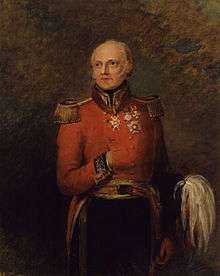George Scovell
| Sir George Scovell | |
|---|---|
 Sir George Scovell by William Salter | |
| Born |
21 March 1774 London |
| Died |
17 January 1861 (aged 86) Guildford |
| Buried | Royal Military College, Sandhurst, cemetery |
| Allegiance |
|
| Service/branch | British Army |
| Rank | General |
| Battles/wars | Napoleonic Wars |
| Awards |
Waterloo Medal Order of St. Vladimir GCB |
| Other work |
Governor of the Royal Military College, Sandhurst |
General Sir George Scovell, GCB (1774–17 January 1861) was a member of the quartermaster's staff of the British Army in Iberia during the Peninsular War.
Military career
Scovell's parents were George Scovell of Cirencester and the daughter of John Fielding.[1] He was commissioned as cornet and adjutant in the 4th Queen's Own Dragoons in 1798.[2]
He served as Deputy Assistant Quarter Master General at the 1809 Battle of Corunna. For his service in the Peninsular War he received the gold cross with one clasp and the silver war medal with eight claps.[3]
Scovell is most remembered for the crucial role he played in breaking the codes of the French forces during that war,[2] their Grande Chiffre. A gifted linguist, he was put in charge of a motley crew of various nationalities recruited for their local knowledge and language skills and called the Army Guides. They developed a system for intercepting and deciphering French communiqués.[4]
In the spring of 1811, the French began using a code based on a combination of 150 numbers known as the Army of Portugal Code. Scovell cracked the code within two days. At the end of 1811, a new code called the Great Paris Code was sent to all French army officers. It was based on 1400 numbers and derived from a mid-eighteenth century diplomatic code (Grande Chiffre) which added meaningless figures to the end of letters. By December 1812, when a letter from Joseph Bonaparte to Napoleon was intercepted, Scovell could decipher enough of it to read Joseph's explicit account of French operations and plans. The information gained proved vital to Wellington's victory over the French at Vitoria on 21 June 1813.[5]
In 1813 Scovell was given the task of raising, then commanding, the Staff Corps of Cavalry, also known as the Staff Dragoons or the Corps of Gendarmerie.[6] This formation, of four troops equipped as light dragoons (though in red uniforms), was the first formal unit of military police in the British army. The Staff Dragoons, in addition to their policing role, undertook escort and other staff-related duties and were also employed as combat cavalry on occasion.
For his service at Waterloo, he was awarded the 4th class of the Order of St Vladimir.[1]
Scovell was made a Knight Commander of the Order of the Bath (KCB) on 2 January 1815 and a Knight Grand Cross (GCB) on 18 May 1860.[2] In later life, Scovell became Lieutenant-Governor (1829–1837) and then Governor (1837-1856) of the Royal Military College, Sandhurst.[2]
Scovell retired from the British Army as a general.
He died at Henley Park, Guildford[3] and was buried in the cemetery of the Royal Military College, Sandhurst (now the RMAS).
Family life
Scovell married the daughter of Samuel Clowes of Broughton, Lancashire in 1805.[1]
Legacy
The Memorials to Governors in the Chapel of the present-day Royal Military Academy Sandhurst includes: In Memory of General Sir George Scovell, G.C.B., Colonel of the 4th Light Dragoons. Born 21st March, 1774. Died 17th January, 1861. He was on the Staff of the Duke of Wellington throughout the Peninsular War, and at Waterloo, and was Governor of this College from 1837 to 1856. [7]
References
- 1 2 3 Dodd, Charles R. (1846). The Peerage, Baronetage, and Knightage, of Great Britain and Ireland, Including All the Titled Classes. p. 357.
- 1 2 3 4 George Scovell at Oxford Dictionary of National Biography
- 1 2 Dalton, Charles (1904). The Waterloo roll call. With biographical notes and anecdotes. London: Eyre and Spottiswoode. p. 36.
- ↑ "George Scovell". National Archives. Retrieved 10 October 2010.
- ↑ Urban, Mark (2001). The man who broke Napoleon's codes. Faber and Faber Limited. ISBN 0-571-20538-0.
- ↑ Arthur Wellesley Duke of Wellington (1832). The General Orders of Field Marshal the Duke of Wellington ... in Portugal, Spain, and France, from 1809-to 1814: And the Low Countries and France, 1815. W. Clowes and Sons. p. 415.
- ↑ Major Augustus F. Mockler-Ferryman F.R.G.S., F.Z.S. `Annals of Sandhurst : a chronicle of the Royal Military College from its foundation to the present day, with a sketch of the history of the Staff College` (London: William Heinemann, 1900)
- Bibliography
- Thomas, Hugh (1961). The story of Sandhurst. Hutchinson.
| Military offices | ||
|---|---|---|
| Preceded by Sir Edward Paget |
Governor of the Royal Military College, Sandhurst 1837–1856 |
Succeeded by Sir Harry Jones |
| Preceded by Sir James Charles Dalbiac |
Colonel of the 4th (The Queen's Own) Regiment of (Light) Dragoons 1847–1861 |
Succeeded by Sir James Hope Grant |